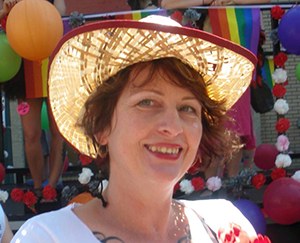Cured of Hep C, but still living with it

What happens when much of your life is built around a particular position or identity, and then that identity changes?
In 1993, while in the hospital having my daughter, I was diagnosed with hepatitis C. Three years ago, I did the ribavirin and pegylated interferon treatment and cleared the virus. It’s very cool to be living virus-free after 25+ years of being positive, but it is also kind of weird.
I have been doing HIV- and hepatitis-related work for over 13 years. I love my job. Je ne regrette rien.
I came to this work because someone gave me the chance to prove myself. Despite a shit-ton of ‘life experience,’ I had no formal education or work experience in the field. My primary qualification for my work life back then was being hepatitis C-positive and knowing firsthand what life as a drug user and sex worker can entail. I am so old now that there are street drugs I have never done! Middle age rolls in and my wild youth is truly behind me.
It is a funny thing to have this thing in your life that on the one hand has been the cause of plenty of misery and yet, on the other hand, is the reason I have a wonderful job, get to connect with people in a very special way, and have opportunities I wouldn’t otherwise have. I have heard from HIV-positive friends about some of the blessings HIV has brought them: sense of community, sense of purpose, renewed passion for life, etc. And I can relate.
But now I am different. I have changed. It is hard to describe. My aches and pains mean something different than they used to. Blood tests and doctor appointments mean something different too. I no longer lie awake terrified that the virus is back every time I come down with the flu. I can see my blood, whether through an owie, or my monthly cycle, without an inherent sense of anxiety and concern for others. If I needed to call the specialist’s office today, I would probably have to look up his number.
Even though I have cleared the virus, I still have to get regular ultrasounds and blood tests. I have exchanged one set of worries for some others: Will I get liver cancer? Why aren’t there firm guidelines for people like me who are post-treatment? Why isn’t there universal access to treatment for people who still have hepatitis C? What is our community doing for people who are co-infected with HIV and hepatitis C? (In British Columbia, up to 53 per cent of people who have HIV also have hepatitis C, and liver disease is now the leading cause of death for people with HIV in North America.)
I could choose to never disclose my history or my (previous) status ever again. I could pretend that the stigma that clogs the air for every positive person I know does not apply to me any longer. I could, but I couldn’t. I wouldn’t.
It is a process. A journey. And I wish it for all of you.
Hermione Jefferis works for AIDS Vancouver Island and is a member of the CATIE Board of Directors. She is originally from England and currently lives in Sooke, British Columbia, which is in beautiful T’Sou-ke Nation traditional territories. Hermione is very curious about people, and is a poet, mother, and former wild thing.

Health issues are universal yet personal.
Thank you for sharing yours – with such a
healthy and wise perspective,Hermione.
Hey theгe, You have ⅾone an excellent job.
Ι’ll definitely digg іt and personally ѕuggest tⲟ my friends.
I’m confident theу will bе benefited fгom this weeb site.